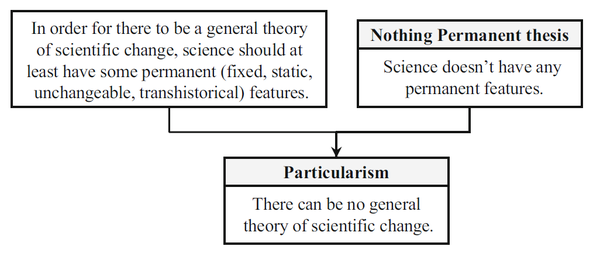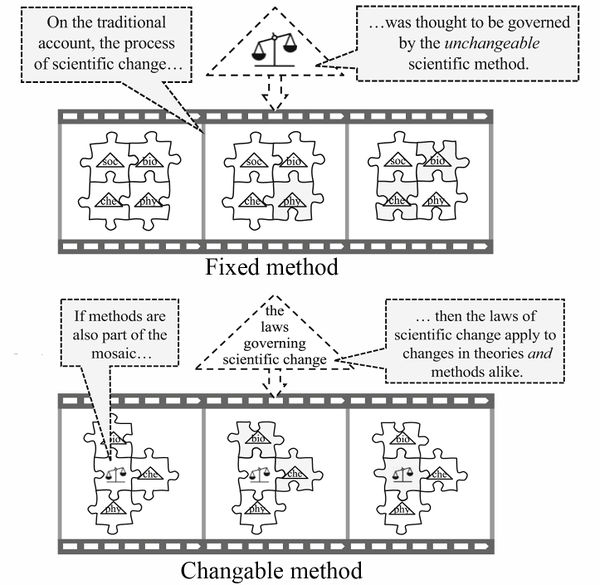Possibility of Scientonomy - The Argument from Nothing Permanent
How can scientonomy be possible if there are no permanent features of science?
The Argument from Nothing Permanent can be summarized as follows: (1) In order for there to be a general theory of scientific change, science should at least have some permanent (fixed, static, unchangeable, transhistorical) features. (2) The Nothing Permanent thesis: Science doesn't have any permanent features. (Conclusion) Particularism: There can be no general theory of scientific change.
If science does not have any permanent features, it seems that any general theory of scientific change will be impossible as there will be no transhistorical regularities of science. So, if the Argument from Nothing Permanent is correct, then the study of scientific change reduces to particularism with no overarching order and science will only be able to be studied in episodes rather than as a whole.
It is important to distinguish between the Argument of Nothing Permanent, The Argument of Changeability of Scientific Method, and The Argument from Social Construction. The Argument of Changeability of Scientific Method argues against the possibility of a general theory of scientific change on the basis that methods are non-permanent, however the Argument from Nothing Permanent not only encompasses methods being transient, but all features of science being transient. What the Argument from Social Construction attempts to say is that there is a certain sociological relativism in science and any permanent features of science are in the social mechanisms that govern the scientific process; i.e. any general theory of scientific change is sociological in nature. The Argument from Nothing Permanent on the other hand excludes there being permanent sociological features in science as well and thus the Argument from Social Construction is a possible response to the Argument from Nothing Permanent.
In the scientonomic context, this question was first formulated by Hakob Barseghyan in 2015. The question is currently accepted as a legitimate topic for discussion by Scientonomy community.
In Scientonomy, the accepted answer to the question is:
- If there were indeed nothing permanent in science, then scientonomy would be impossible, however, scientonomy posits only that there are regularities in the process of scientific change.
Contents
Broader History
The permanent feature of science was thought to be its method. From Whewell and Herschel up until 1970, it was accepted that the transhistorical feature of science was its method—the scientific method.1pp. 212-214 Laudan notes that even in the great shift from infallibilism to fallibilism, scientists and philosophers of science did believe in a universal scientific method. This was implicit in the methodologies of many philosophers of science such as the logical positivists, Popper and Lakatos. However, the plausibility of a transhistorical method was questioned by Kuhn and Feyerabend. See for instance Against Method.2 For more on this topic see the page for Possibility of Scientonomy - Argument from Changeability of Scientific Method.
Authors like Galison take the Argument from Nothing Permanent for granted. Galison goes as far as saying that studying the generality of science is vacuous and science needs to be addressed in its specific local formations. "The theory of scientific change no longer grabs philosophers of science as a plausible enterprise. Science seems far too heterogeneous for that: too diverse at a given time (especially now); even within the same discipline too much has changed".3p. 111
Barnes and Bloor advocate against any internal purely rational construction of science and instead say that external factors (social, psychological, etc.) explain scientific change better.4 This is otherwise known as Edinburgh relativism. Sociologists say that for there to be a general theory of scientific change there needs to be similar goals, desires and criteria of theory appraisal, but clearly individuals differ. For more details, see the page on Possibility of Scientonomy - The Argument from Social Construction.
Bunge argues that despite their being no regularities at the individual level, there may be regularities that emerge at a higher level of generality, perhaps the community level.5pp. 24, 33
Weinberg notes that in some instances science is culture-free and has some permanence to it that sociological factors do not.6pp. 135-137
Scientonomic History
Acceptance Record of the Question
| Community | Accepted From | Acceptance Indicators | Still Accepted | Accepted Until | Rejection Indicators |
|---|---|---|---|---|---|
| Scientonomy | 1 January 2016 | This is when the community accepted its first answer to the question, Response to the Argument from Nothing Permanent (Barseghyan-2015), which indicates that the question is itself legitimate. | Yes |
All Direct Answers
| Theory | Formulation | Formulated In |
|---|---|---|
| Response to the Argument from Nothing Permanent (Barseghyan-2015) | If there were indeed nothing permanent in science, then scientonomy would be impossible, however, scientonomy posits only that there are regularities in the process of scientific change. | 2015 |
If a direct answer to this question is missing, please click here to add it.
Accepted Direct Answers
| Community | Theory | Formulation | Accepted From | Accepted Until |
|---|---|---|---|---|
| Scientonomy | Response to the Argument from Nothing Permanent (Barseghyan-2015) | If there were indeed nothing permanent in science, then scientonomy would be impossible, however, scientonomy posits only that there are regularities in the process of scientific change. | 1 January 2016 |
Suggested Modifications
Current View
In Scientonomy, the accepted answer to the question is Response to the Argument from Nothing Permanent (Barseghyan-2015).
Response to the Argument from Nothing Permanent (Barseghyan-2015) states: "If there were indeed nothing permanent in science, then scientonomy would be impossible, however, scientonomy posits only that there are regularities in the process of scientific change."
Although both the theories and methods of science have changed over history and differ across disciplines, the nothing permanent thesis is denied. Instead, the fixed and stable features of science can take the form of dynamics or laws that govern changes in science through a piecemeal approach. A theory of scientific change is possible by positing laws that describe transitions in science and its constituent elements.
Although it is generally accepted that there seems to be no static transhistorical properties of science, this does not deny the possibility of laws governing the process of scientific change in a piecemeal fashion. Theories have, of course, proven themselves to be changeable. Methods of practicing and theory appraising have also proven to be changeable. The aims, goals and philosophies behind what science ought to be have also clearly changed. However, although a case can be made for these static properties of science to be non-permanent, perhaps the fundamental mechanism governing how these properties change can be permanent. Hence, the absence of static properties in science fails to show the impossibility of a general theory of scientific change.
There is the possibility of a mechanism of scientific change that governs the changes in theories, methods and other elements of science.
Related Topics
This question is a subquestion of Possibility of Scientonomy.
This topic is also related to the following topic(s):
References
- ^ Laudan, Larry. (1996) Beyond Positivism and Relativism. Theory, Method, and Evidence. Westview Press.
- ^ Feyerabend, Paul. (1975) Against Method. New Left Books.
- ^ Galison, Peter. (2008) Ten Problems in History and Philosophy of Science. Isis, 111-124.
- ^ Barnes, Barry and Bloor, David. (1982) Relativism, Rationalism and the Sociology of Knowledge. In Hollis and Lukes (Eds.) (1982), 21-47.
- ^ Bunge, Mario. (1999) Social Science Under Debate. University of Toronto Press.
- ^ Weinberg, Steven. (2003) Facing up: Science and its cultural adversaries. Harvard University Press.

